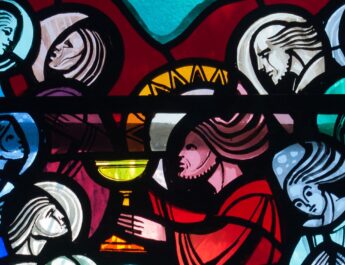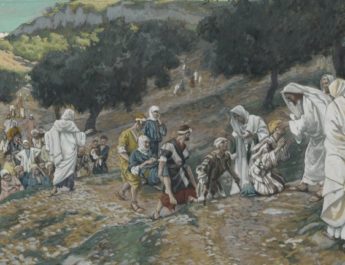John 5:1-9
Eastertide C26
1 After this there was a festivalA of the Jews,B and JesusC went upD to Jerusalem.E
A “festival” = heorte. This is a holiday or feast.
B “Jews” = Ioudaios. From Ioudas (Judah, Judas); from Hebrew Yehudah (Judah, son of Jacob, his tribal descendants, a name for the southern kingdom. Literally, it means praised); probably from yadah (to throw one’s hands into the air in a gesture of praise); from yad (hand). This is Jewish, a Jew, or Judea.
C “Jesus” = Iesous. From Hebrew Yehoshua (Joshua, the Lord is salvation); {from YHVH (proper name of the God of Israel; the self-existent and eternal one); {from havah (to become) or from hayah (to come to pass, become, be)} + yasha (to deliver, defend, help, preserve, rescue; properly, to be open, wide or free, which implies being safe. So, in a causative sense, this is to free someone)}. This is Jesus or Joshua in Greek – the Lord saves or the Lord is salvation.
D “went up” = anabaino. From ana (up, back, among, again, anew) + the same as basis (step, hence foot; a pace); {from baino (to walk, to go)}. This is to come up in a literal or figurative sense – ascent, rise, climb, enter.
E “Jerusalem” = Hierosoluma. From Hebrew yerushalaim (probably foundation of peace); {from yarah (to throw, shoot, be stunned; to flow as water so figuratively to instruct or teach) + shalam (to make amends, to be complete or sound)}. This is Jerusalem, dwelling of peace.
2 Now in Jerusalem by the Sheep GateF there is a pool,G calledH in HebrewI Beth-zatha,J
F “Sheep Gate” = probatikos. Related to “went up” in v1. 1x in NT. From probaton (literally easily led and so a sheep or another grazing animal. Also use figuratively of people who are led easily); {probably from probaino (to go forward literally or to advance in years); {from pro (before, ahead, earlier than, above) + the same as basis (a step, pace, foot); {from baino (see note D above)}}}. This is relating to sheep. So, it could be a market or a gate for sheep.
G “pool” = kolumbethra. 4x in NT. From kolumbao (properly, to dive; also to swim); from kolumbos (a diver). This is literally a place for swimming or diving. So, it is a pond or a pool. This is where the name “Columbus” comes from.
H “called” = epilego. 2x in NT. From epi (on, upon, to, what is fitting) + lego (to speak, tell, mention). This is to call, name, or select.
I “in Hebrew” = Hebraisti. 7x in NT. From Hebrais (Hebrew language, Aramaic); from Eber (Heber); from Hebrew Eber (the region beyond; Eber, the name of several Israelites including a descendant of Shem); from abar (to pass over, pass through, or pass by; cross over or to alienate; used for transitions). This is Hebrew, perhaps meaning a descendant of Eber. This is in Hebrew or in Aramaic.
J “Beth-zatha” = Bethzatha. 1x in NT. Probably from Aramaic, related to Hebrew Bethesda (Bethesda, “house of mercy”); {from bayit (house, court, family, palace, temple); {from banah (to build)} + chasad (being good, kind, merciful; may mean bowing one’s neck as is done in the presence of an equal for courtesy’s sake; so, if one in a superior position is treating you like an equal, that is what is captured here)}. This is Beth-zatha or Bethesda, a pool whose name means “house of mercy” or “house of kindness.” See https://www.abarim-publications.com/Meaning/Bethesda.html
which hasK fiveL porticoes.M 3 In these layN manyO invalidsP—
K “has” = echo. This is to have, hold, possess.
L “five” = pente. This is five. It may be symbolically associated with the Temple or redemption.
M “porticoes” = stoa. 4x in NT. Probably from histemi (to stand, place, set up, establish, stand firm). This is a portico, colonnade, or piazza.
N “lay” = katakeimai. 12x in NT. From kata (down, against, throughout, among) + keimai (to lie, recline, be placed, lie outstretched, be appointed). This is to lie down, whether for a meal or as one sick in bed.
O “many” = plethos. From pletho (to fill, accomplish, supply; to fill to maximum capacity). This is fullness, multitude, great number.
P “invalids” = astheneo. From asthenes (not having strength or weak in a moral sense; sick); {from a (not) + sthenes (strong, vigor); {from the base of sthenoo (to strengthen so that one can be mobile); from sthenos (strength)}}. This is sick, feeble, languishing, impotent. Can also refer to moral weakness.
blind,Q lame,R and paralyzed.S
Q “blind” = tuphlos. Derivation unclear. Perhaps from tuphoo (to be conceited, foolish, puffed up, haughty; properly, to blow smoke; figuratively being muddled or cloudy in mind; poor judgment that harms spiritual clarity; also, being covered with smoke – so filled with pride); from tuphos (smoke, vanity, arrogance); from tupho (to raise smoke, smolder, slowly consume without flame). This is blind or a blind person – perhaps in the sense of smoke making things opaque and impossible to see. This is blind literally or figuratively.
R “lame” = cholos. 14x in NT. This is lame or limping. It can also mean missing a foot.
S “paralyzed” = xeros. 8x in NT. This is dry, arid, withered. It can also refer to dry land or imply something that is shrunken.
T “waiting for” = ekdechomai. 7x in NT. From ek (from, from out of) + dechomai (to warmly receive, be ready for what is offered, take, accept, or welcome; to receive in a literal or figurative sense)}. This is to take or receive, expect, await; to welcome someone from your heart; focusing on the goal of waiting or the outcome.
U “stirring” = kinesis. 1x in NT. Perhaps related to “was” in v4:46. 1x in NT. From kineo (to move, excite, or provoke. It is to stir in a literal or figurative sense); perhaps from kio (poetic way of saying to be); from eimi (see note VII above). This is agitation or moving.
V “water” = hudor. Perhaps from huetos (rain); from huo (to rain). This is water literal or figurative. It is one of the roots that “hydrogen” and “hydroelectric” come from.
4 for an angelW of the Lord went downX at certain seasonsY into the pool, and stirred upZ the water;
W “angel” = aggelos. Probably from ago (to lead, bring, carry, guide) + agele (flock, herd, drove); {also from ago (see above)}. This is angel or messenger. Properly, it is one sent with news or to perform a specific task. This messenger can be human or an angel from heaven. More commonly, it is used for angels in the New Testament.
X “went down” = katabaino. Related to “went up” in v1 & “Sheep Gate” in v2. From kata (down, against, throughout, among) + baino (see note D above). This is to come down whether from the sky to the ground or from higher ground to lower. It can be used in a literal or figurative sense.
Y “seasons” = kairos. This is season, opportunity, occasion. The word chronos is used for chronological time. Kairos is used for spiritually significant time – the right time or appointed time.
Z “stirred up” = tarasso. 18x in NT. This is trouble, agitate, stir up. It is motion back and forth, creating inner turmoil or confusion, roiling water.
whoever stepped inAA firstBB after the stirringCC of the water
AA “stepped in” = embaino. Related to “went up” in v1 & “Sheep Gate” in v2 & “went down” in v4. 17x in NT. From en (in, on, at, by, with) + baino (see note D above). This is to step onto – embark on a boat.
BB “first” = protos. From pro (before, first, in front of, earlier). This is what is first, which could be the most important, the first in order, the main one, the chief.
CC “stirring” = tarache. Related to “stirred up” in v4. 1x in NT. From tarasso (see note Z above). This is a stirring up or agitation, as of water. Figuratively, it can refer to drumming up sedition or riling up a mob.
was madeDD wellEE from whatever diseaseFF that person had.]GG
DD “was made” = ginomai. This is to come into being, to happen, become, be born. It can be to emerge from one state or condition to another or is coming into being with the sense of movement or growth.
EE “well” = hugies. 12x in NT. Perhaps from auksano (to grow or enlarge, whether literal or figurative). This is healthy, whole, pure, normal, restored, wholesome. Figuratively, it can mean a sound or true teaching. It is where “hygiene” comes from.
FF “disease” = nosema. 1x in NT. From noseo (to be sick; it can also refer to spiritual sickness or a problematic desire or longing); from nosos (a disease that is chronic and enduring. It can also be used for a moral failing). This is a sickness or ailment. It focuses on the impact of the illness – particularly mental anguish.
GG “had” = katecho. Related to “has” in v2. 18x in NT. From kata (down, against, according to, throughout) + echo (see note K above). This is to hold fast, bind, possess, restrain, arrest, suppress. It is to hold down in a literal or figurative sense. It can also be to hold something in one’s memory.
5 One manHH was there who had beenII illJJ for thirty-eightKK years.
HH “man” = anthropos. Probably from aner (man, male, husband) + ops (eye, face); {from optanomai (to appear, be seen); perhaps from horao (become, seem, appear)}. This is human, humankind. Used for all genders.
II “been” = echo. Same as “has” in v2. See note K above.
JJ “ill” = astheneia. Related to “invalids” in v3. From asthenes (see note P above). This is weakness, frailty, illness, suffering, or calamity. It is any kind of sickness or injury that includes weakness or diminishes your ability to enjoy or accomplish what you would choose.
KK “thirty-eight” = triakonta + kai + okto. Literally, “thirty and eight.” Triakonta is 11x in NT. From treis (three). This is thirty. Okto is 10x in NT. This is eight.
6 When Jesus sawLL him lying there and knewMM that he had beenNN there a longOO time,PP he saidQQ to him, “Do you wantRR to be made well?”
LL “saw” = horao. Related to “man” in v5. See note HH above.
MM “knew” = ginosko. This is to know, recognize, realize, perceive, learn. It is knowledge gained through personal experience.
NN “been” = echo. Same as “has” in v2. See note K above.
OO “long” = polus. This is much, often, plenteous – a large number or a great extent.
PP “time” = chronos. Time in the chronological sense, quantitative time or a duration of time.
QQ “said” = lego. Related to “called” in v2. See note H above.
RR “want” = thelo. This is to wish, desire, will, or intend. It is to choose or prefer in a literal or figurative sense. It can also mean inclined toward or take delight in. It can have a sense of being ready to act on the impulse in question.
7 The sick manSS answered him, “Sir,TT I have no oneUU to putVV me into the pool when the water is stirred up; and while I am making my way,WW someone elseXX steps downYY ahead of me.”
SS “sick man” = astheneo. Same as “invalids” in v3. See note P above.
TT “Sir” = Kurios. From kuros (authority, supremacy). This is a respectful address meaning master or sir. It refers to one who has control or power greater than one’s own. So, it was also applied to God and Jesus as Master or Lord.
UU “one” = anthropos. Same as “man” in v5. See note HH above.
VV “put” = ballo. This is to throw, cast, rush, place, or drop. It is throwing, but it could be with more or less velocity and with more or less force/violence.
WW “making my way” = en + hos + de + erchomai. Literally, “in which I am going.” Erchomai is to come or go.
XX “someone else” = allos. This is other, another. Specifically, it is another of a similar kind or type. There is a different word in Greek that speaks of another as a different kind (heteros).
YY “steps down” = katabaino. Same as “went down” in v4. See note X above.
8 Jesus said to him, “Stand up,ZZ takeAAA your matBBB and walk.”CCC
ZZ “stand up” = egeiro. This is to awake, raise up or lift up. It can be to get up from sitting or lying down, to get up from sleeping, to rise from a disease or from death. Figuratively, it can be rising from inactivity or from ruins.
AAA “take” = airo. This is to lift up in a literal or figurative sense. So, it could mean to lift, carry, or raise. It could also imply lifting something in order to take it away or remove it. Figuratively, this can be used for raising the voice or level of suspense. It can mean sailing off as raising the anchor. It can also correspond to a Hebrew expression for atonement of sin (lift/remove sin).
BBB “mat” = krabattos. 11x in NT. From Ancient Macedonian grabos (oak or beech). This is a bed or pallet. It is a place for poor people, perhaps made of a quilt or a mat. Always used to refer to sick people on mats – 9x in the Gospels and 2x in the book of Acts.
CCC “walk” = peripateo. From peri (about, concerning, around, encompassing) + pateo (to read, trample on; to trample literally or figuratively); {from patos (trodden) OR from paio (to strike, smite, sting; a hit like a single blow)}. This is to walk. Going from Hebrew figurative language, to walk referred to how you conducted your life, how you chose to live. This word is most literally walking around. Figuratively, it is living, behaving, following, how you occupy yourself. This is where “peripatetic” comes from.
9 At onceDDD the man was made well, and he took up his mat and began to walk. Now that dayEEE was a sabbath.FFF
DDD “at once” = eutheos. From euthus (immediately, upright, straight and not crooked); {perhaps from eu (good, well, well done, rightly) + tithemi (to place, lay, set, establish)}. This is directly, soon, at once.
EEE “day” = hemera. Perhaps from hemai (to sit). This is day, time, or daybreak.
FFF “sabbath” = sabbaton. From Hebrew shabbath (sabbath); from shabath (to rest, stop, repose, cease working; by implication, to celebrate). This is the sabbath. It can also be used as shorthand for a week i.e. the time between two sabbaths.
Image credit: “Tionesta Whirlpool” at the Tionesta Creek in Allegheny National Forest in Pennsylvania. Photo by IvoShandor, 2006.




